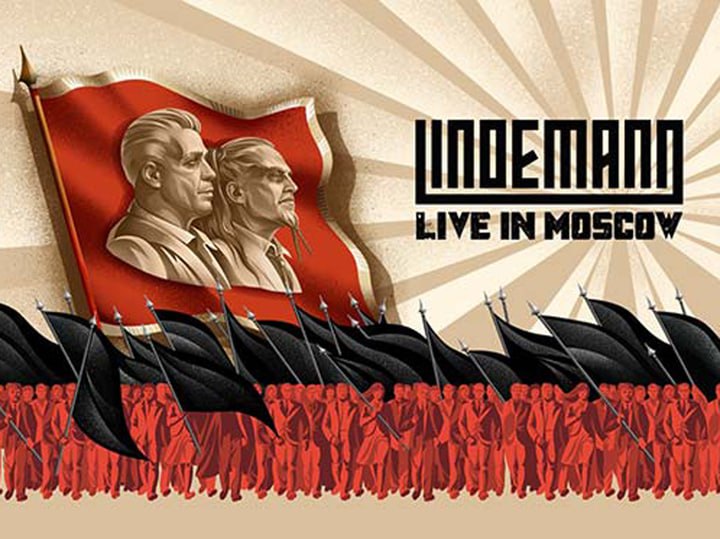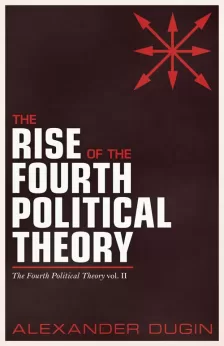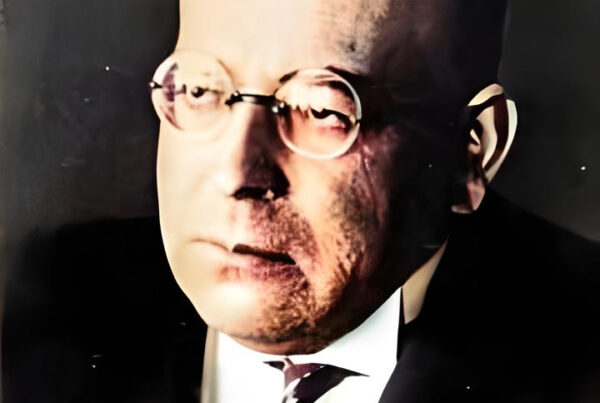The Sign of Change
The death throes of the German Democratic Republic proved to be the birth pangs for the emergence of a unique philosophical-sociological phenomenon: Rammstein. The bubble of ‘real socialism’ burst and the Wind of Change blew into the lungs of the Eastern Bloc with full force. Like Hansel and Gretel, the children of the Wall set off, leaving behind the cold, unloved prefab home, in search of warmth, well-being, fresh air, and freedom, through the unfamiliar, unknown forest to the ‘hope-green land’, ‘sought, surmised, and never known’.1
Yet behind the lush sugar splendour, the witch lurked by the hot oven. This entire path of suffering, full of hope, disappointment, fear, horror, intoxication and disillusionment, compresses like a thick bitter grape juice in Rammstein’s complete works. Once thrown into the witch’s oven, Rammstein’s heart will always burn – like from the bronze Sicilian bull, its music sounds so sweet and at the same time so deeply agonising. Since art per se has the function of systematising, archiving, and reproducing the present, the existing, the zeitgeist, we are dealing with certain chronicles of longing – the German longing!
In the Twilight of the Age
A fragment-rich conception that exhibits constructivist pretensions. The strict poetry, the unmistakable sound of ‘Neue Deutsche Härte’ (New German Hardness) carries within itself the distant sound from the gigantic concrete constructions of socialist modernity. But that is fading in the clear postmodernist elements of recycling and devaluing semantic building blocks of the past. The dismantling and absence of existence and its meaningfulness leads into the typical ‘post-nihilistic’ dead end of postmodernity. (‘Deutschland’ – ‘Germany’) However, this artistic manner has a very specific intention – through grotesque irony, sometimes bizarre and perverse provocations, a clear message is generated: ‘This world is sick, ugly, deviant and hypocritical.’ (‘Mein Teil’, ‘Spiel mit mir’, ‘Zwitter’, ‘Stein um Stein’, ‘Mann gegen Mann’, ‘Tier’ – ‘My Part’, ‘Play with Me’, ‘Hermaphrodite’, ‘Stone by Stone’, ‘Man against Man’, ‘Animal’) Thus, we cannot consider Rammstein as a purely postmodernist project. It has a skeleton, structure, a representative function and a critical and even politically incorrect core. (‘Amerika’ – ‘America’) Its entirety, its solid form is integrated into reality – it commands a vertical, hierarchical communication. Almost like a dictatorship of forms, sounds, and symbols. With an unmatched expressive power of rich musical pigments, like a flock of symbols penetrating under the skin, Lindemann’s lyrics march into the ruthless ‘Götterdämmerung’ (‘Twilight of the Gods’) of the Occident. This undemocratic aristocracy2 of the grotesque adorns itself with the ornaments of German Romanticism and Gothic down to the epoch of the Enlightenment. (‘Heirate mich’, ‘Feuerräder’, ‘Wilder Wein’, ‘Sonne’, ‘Rosenrot’, ‘Dalai Lama’) – ‘Marry me’, ‘Firewheels’, ‘Wild Wine’, ‘Sun’, ‘Rose Red’, ‘Dalai Lama’)
Too German
And it goes even further, in a direction unacceptable for neoglobalist ideology. The language!
In Lindemann’s poetry, inspired by the poets of German Romanticism, the forgotten melancholy and grace of the German language bloom anew. (‘Nebel’, ‘Ohne dich’, ‘Amour’, ‘Wilder Wein’, ‘Seemann”Fog’ – ‘Without you’, ‘Love’, ‘Wild Wine’, ‘Seaman’) This has awakened the fascination with the old German classics and philosophers not only in Germany but also in the former Eastern Bloc. Rammstein has popularised German worldwide and that cannot be denied. But this is the smallest thorn in the eye of the neo-liberal witch from the gingerbread house. She has struck her flags clearly and deeply into the marrow of the German masses: she has recognised her old arch-enemy again and pointed it out with a crowing cry. Russia! Even though Till Lindemann openly spoke out against the military operation in Ukraine and supported the Ukrainians alongside his bandmates, his warm connection with the Russian people works against him. ‘The market doesn’t matter to me. I grew up in East Germany and Russia was part of my childhood, my youth. Our countries were very friendly. That is a very important part of my life,’ Till Lindemann said on Lente.ru. And he has proven this with numerous concerts in Russia and songs in Russian. Whether this is the trigger for the current witch-hunt against his person remains unimportant. Whether victim or perpetrator, Rammstein remains an organically grown part of the German cultural body.
Postmodernity Devours Its Stepchildren
Madness is too archaic, too content-rich, and still too concrete for the complete deconstruction of concepts. ‘Madness is just a narrow bridge, The shores are reason and instinct.’3 No matter how deep and deviant the works of Rammstein may turn out to be, they address certain moral categories. Stimulating interpretations and the search for connections and interdependencies within the social fabric. As Lindemann himself admits, many compositions on the album Sehnsucht (‘Longing’) were inspired by newspaper articles. They go over everything: politics, culture, church, customs, and history. Throw a stone into the swamp of reality. The reality that only allows one recognised ‘mirror’. Where old, sick, ugly, and unhappy are simply swept under the rainbow or utilised in ghastly talk and reality shows. Post-culture will marginalise concepts like Rammstein. They are wolves in the pasture of the aimless and ephemeral ruminants. They have ripped open enough throats, now the anaemic remains of the demoralised human substances come into the slaughterhouse of final dehumanisation.
Footnotes
1Georg Philipp Schmidt von Lübeck, ‘Des Fremdlings Abendlied’ (‘The Stranger’s Evening Song’).
2Artocracy (Wagner Principle). ‘People should nourish themselves with artworks. Art is the coarsest shell of an idea, its materialization, plasmification. Every object in our politics must be beautiful above all. Ugly objects are to be destroyed.’ Alexander Dugin, ‘Horizon of an Ideal Empire’.
3Rammstein: ‘Du riechst so gut’ (‘You Smell So Good’)











Surely this article must be motivated by the recent Till Lindemann allegations, which is neither an attack on the author or Till Lindemann, only a reminder of the obvious elephant in the room here.
Exactly! The reason for the article is the brutal manipulation and agitation of the mainstream media in the Lindemann case, in which there is no court decision. The purpose of the article is not to moralize and judge, but first of all to create a rough, unbiased sketch of the cultural phenomenon “Rammstein”.